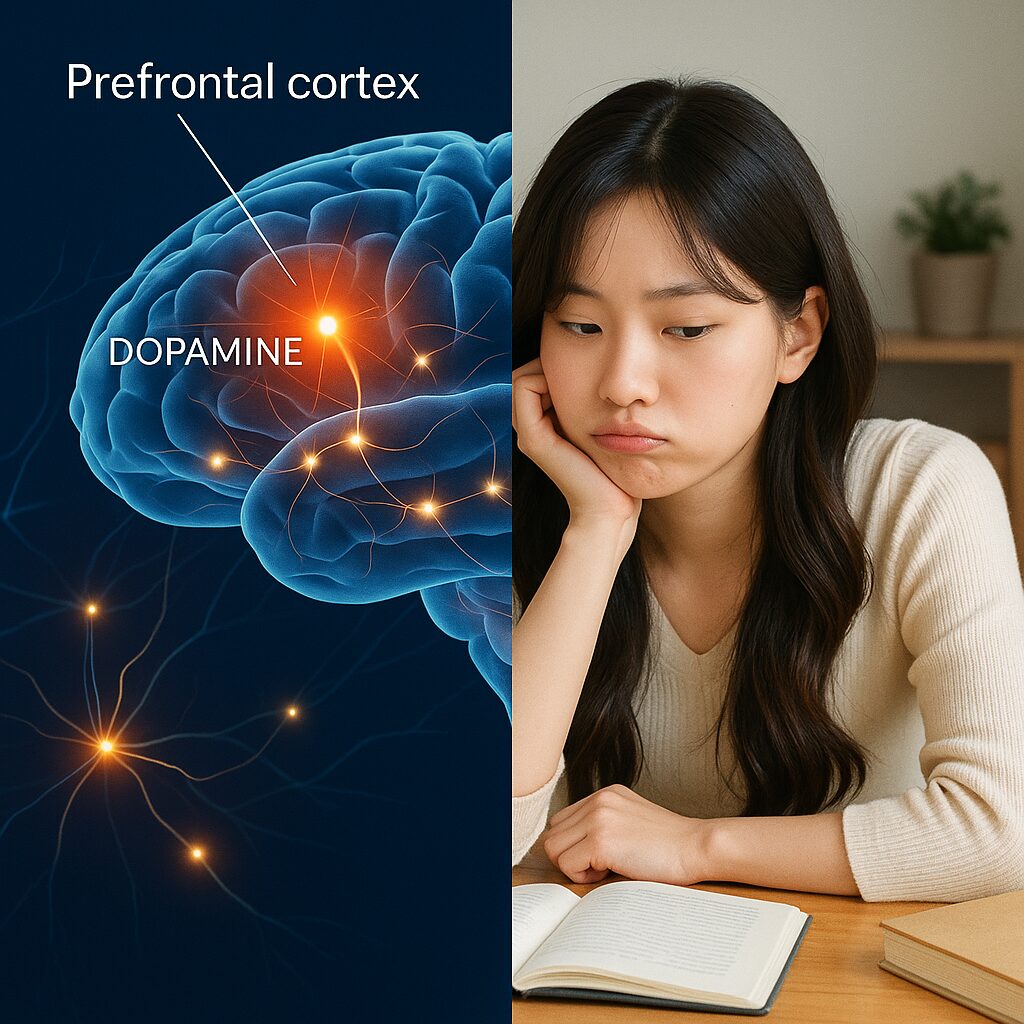The Modern Attention Crisis and the Science of Meditation – About ADHD and the Comma of the Mind
We’ve probably all said it to ourselves or in conversation with someone at one point or another.
Despite our busy schedules, our focus is becoming increasingly fuzzy, and we feel strangely tired after doing nothing.
Sometimes, just sitting at your desk makes your head spin. There are even days when you end up staring blankly at your smartphone screen.
*** Translated with www.DeepL.com/Translator (free version) ***

This “attention crash” isn’t just a matter of laziness. It’s an everyday phenomenon that affects many people today, and the reason behind it is an overload in the way the brain is structured and processes information..
In this article, we take a neuroscience look at the underlying causes of poor attention and mental fatigue,
especially in the context of attention deficit hyperactivity disorder (ADHD).
It also explores how meditation, an emerging alternative, can help restore and balance the brain, and its promise based on scientific research..
1. Why Can’t We Focus? – Dopamine and Executive Function Fatigue
Concentration isn’t just a matter of willpower.
The human brain works in multiple parts simultaneously to take in and interpret information and maintain attention on a goal.
In particular, the prefrontal cortex is responsible for so-called “executive functions” such as planning, impulse control, and working memory.
However, stimuli that provide immediate rewards, such as smartphones, notifications, and social media, overstimulate the brain’s dopamine system.
*** Translated with www.DeepL.com/Translator (free version) ***.

Dopamine is a neurotransmitter involved in pleasure and motivation, and as we get used to repetitive stimuli, our brains seek out “stronger stimuli”.
This can lead to a sharp drop in concentration during mundane tasks and relatively “boring” tasks like learning or reading.
This phenomenon is sometimes referred to as digital dopamine addiction.
In addition, the amount of information in our daily lives has already exceeded the brain’s sensory processing capacity. This is called “sensory overload,” and it’s another cause of fatigue and poor concentration.
*** Translated with www.DeepL.com/Translator (free version) ***

2. The Brain of ADHD – More Than Just Distraction
Attention problems can happen to anyone, but for some people, they manifest as more persistent and functional difficulties.
Attention-deficit/hyperactivity disorder (ADHD) shouldn’t be dismissed as a problem of “distracted kids”.
According to the American Psychiatric Association’s DSM-5 criteria, ADHD is diagnosed when symptoms such as inattention, difficulty controlling impulses, and hyperactivity persist for at least six months and significantly affect a person’s academic or social life.
The brains of people with ADHD are neurologically different from those of the general population.
*** Translated with www.DeepL.com/Translator (free version) ***

For example, the:
- Abnormal activation of the prefrontal lobe
- Decreased function of the basal ganglia
- Changes in the sensitivity of dopamine receptors
Because of these differences in brain structure and function, people with ADHD have difficulty making plans, staying on task, and self-regulating. They are especially prone to attention shifts and are sensitive to immediate stimuli rather than long-term goals.
3. The science of meditation – a ‘mind reboot’ to turn your brain back on
So, does meditation work for these complex brain problems?
Surprisingly, a lot of research supports it.
One of the most popular meditation-based programs
– MBSR(Mindfulness-Based Stress Reduction)
– MBCT(Mindfulness-Based Cognitive Therapy)
is widely used to prevent and alleviate mental illness, and its benefits are backed by neuroscience.

A Harvard Medical School study (2011, Dr. Sara Lazar) reported that participants who received eight weeks of MBSR training showed the following changes in brain structure:
- Increased thickness of the prefrontal lobe → Improved ability to focus and make decisions
- Activation of the hippocampus → enhanced ability to regulate emotions
- Shrinkage of the amygdala → Reduced stress response
Meditation also helps to reduce the activity of the Default Mode Network (DMN).
The DMN is a network associated with mindlessness, ruminating, and over-engagement with the self, and when over-activated, it can lead to anxiety, depression, and distraction.

Meditation reduces the activity of the DMN, keeping your attention in the present moment.
In fact, a study of meditation therapy for adolescents with ADHD (Meditation-Based Attention Training, 2019) found statistically significant improvements in participants’ executive functioning and self-regulation. Specifically, regular mindfulness practice reduced hyperactivity and contributed to emotional stability.
*** Translated with www.DeepL.com/Translator (free version) ***

Your brain needs a break.
We’re using our brains too long and too hard. It’s like a computer that’s never been turned off. What we need is not a big solution. Just five minutes of consciously focusing on your breathing, or closing your eyes for a moment and noticing the sensations in your body, can give your brain a ‘reboot’..

Example meditation routines you can do now
- 🧘♀️ 3-Minute Breathing Meditation: Close your eyes and breathe in through your nose for 3 seconds, hold for 4 seconds, and exhale for 5 seconds.
- 🛏️ Body scan meditation: Relax by noticing the sensations in your body from head to toe.
- Tea meditation: Sip a cup of warm tea and focus on the temperature, aroma, and sensations in your mouth.
The more dizzy you feel, the more likely it is that it’s time to stop. Your brain is more resilient than you think. Just give it time to breathe again in silence.
📌 References (citing indirect sources):
- Sara Lazar et al., Harvard Medical School (2011). “Meditation experience is associated with increased cortical thickness”
- American Psychiatric Association. DSM-5, ADHD Criteria
- Zylowska L. et al., (2008). Mindfulness meditation training in adults and adolescents with ADHD
- Brewer, J. et al. (2011). Meditation experience is associated with reduced DMN activity
- Kabat-Zinn J., Full Catastrophe Living
Mental health, ADHD, attention deficit, executive function, dopamine system, meditation, mindfulness,
MBSR, MBCT, digital fatigue, smartphone addiction, neuroscience, prefrontal, default mode network,
how to improve focus, stress management, sensory overload, recovery from mental fatigue, how to restore your brain, how to recover from mental fatigue


